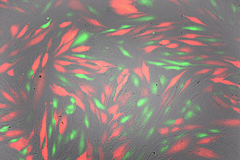Scientists at the Institute of Cytology of the Russian Academy of Sciences have discovered resistance to anti-aging drugs

Image: Godnauki.rf
Scientists at the Institute of Cytology of the Russian Academy of Sciences have found that some senescent cells are resistant to senolytic drugs and mechanisms that provoke programmed cell death. Such cells limit the effectiveness of anti-aging drugs and continue to have harmful effects on the environment. This was reported in a press release from the study, published on the website Godnauki.rf.
Normally, aging (or senescent) cells are destroyed by the immune system, however, with age or with various diseases, cleansing becomes less effective. As a result, the risk of inflammatory reactions, as well as neurodegenerative diseases, such as Parkinson's or Alzheimer's disease, osteoarthritis, and cardiovascular disorders, increases. Previously, it was thought that senolytics block any mechanisms that increase the survival of senescent cells during apoptosis (the process of programmed cell death), but a new study has shown that this is not the case.
The researchers conducted experiments on stem cells that are capable of transforming into various types of other cells: fat, bone, cartilage, muscle and nerve. The cultures were exposed to DNA damaging substances and hydrogen peroxide, which triggers oxidative stress, to simulate the aging process. After a certain time, scientists tried to kill cells with senolytics.
The results showed that all stem cell types were found to be drug resistant. Thus, senolytics act only on those cells that have not acquired resistance to apoptosis. According to the authors of the work, it is likely that the drugs affect other mechanisms necessary for the survival of old cells, and not those associated with apoptosis. To kill these cells, additional drugs must be used.

